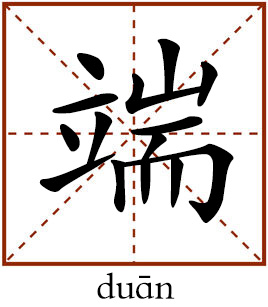Duan

In “Duanwu Festival,” the character duan means the beginning or start. The term duanwu first appeared in a book of the local customs and practices in the Western Jin Dynasty (266–316), Fengtu Ji. In ancient China, the first few days of a month were called duan. For example, the first day of a month was called duanyi (yi means the first). According to the Fengtu Ji, duanwu refers to the fifth day of a month.
古诗中的端午
gǔ shī zhōng de duān wǔ
Gushi refers to ancient poetry and duanwu is the Dragon Boat Festival. This is a brief introduction of several poems related to this festival.
The most representative festive practice, dragon boat racing, became popular during the Tang Dynasty, inspiring many poets of the times. A Tang poet named Zhang Jianfeng depicted this grand occasion in one of his poems. He first portrays the banks of the river crowded with observers, whose silk dresses smell sweet and silver hairpins glitter like sharp blades in the sunlight. Then he uses metaphors to depict the race. For example, he compared the swinging paddles to tens of thousands of flying swords to indicate the rapid paddling. Rolls of thunder are used to describe the pounding of drums that “split open the waves.” Colorful flags on the boats fluttered like rainbows, making people feel dizzy. Another poet of the Tang Dynasty, Yin Xiaofan, expresses his sentiment about the passing of time. He first mentions that young people are always happy during the festival because they can participate in various festival activities. However, when they get old, they tend to be depressed for being too weak to practice these festive traditions.
The Qing poet Li Jingshan depicted how the common people celebrated this festival. The poem first states that the Qing people prepared seasonal fruits, such as cherries and mulberries, and calamus and realgar wine for the festival. Then the families hang yellow paper on their doors to keep misfortune or disease away. However, the people still worry that the yellow paper won’t stop their creditors from coming down on them. This poem reflects the real lives of poor people in the Qing Dynasty, who could not celebrate the festival cheerfully because of their heavy debt.
edited by REN GUANHONG
